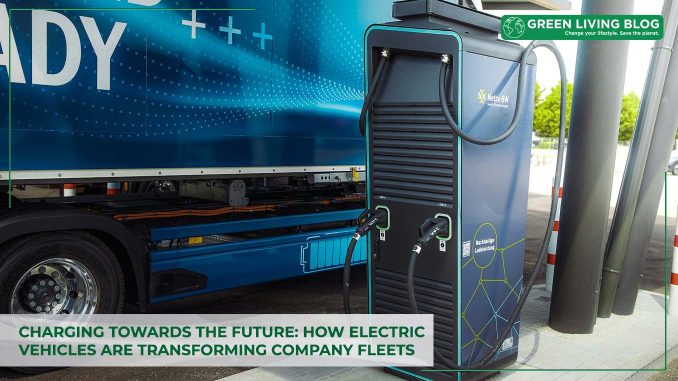
In an era where environmental consciousness is paramount, businesses are increasingly turning to electric vehicles (EVs) to revolutionise their fleets.
This shift is driven by the urgent need to adopt cleaner, sustainable transport modes to counteract climate change effects and the growing awareness of the environmental impact of diesel-powered vehicles.
This article delves into how electric vehicles, including electric trucks, are reshaping company fleets, highlighting their benefits, challenges, and the future prospects of this transition.
The Rise of Electric Vehicles in Company Fleets

The transportation sector, a significant contributor to global greenhouse gas emissions, is undergoing a transformation with the advent of electric vehicles. Companies are embracing EVs, recognising their potential to reduce carbon footprints and promote sustainability.
The switch to electric vehicles is not just environmentally driven but also economically advantageous. With lower operating costs due to cheaper electricity and less maintenance and incentives from governments, the shift to electric fleets is becoming increasingly appealing for businesses.
Benefits of Electric Trucks in Freight Transportation

Electric trucks are at the forefront of the transition towards sustainable transportation in the freight industry. Their increasing popularity stems from several key advantages they offer over traditional diesel trucks:
Reduced Environmental Impact: Unlike diesel engines, electric trucks produce zero tailpipe emissions, significantly lowering the carbon footprint of freight transport. This is crucial for companies aiming to meet sustainability goals and reduce their environmental impact.
Economic Efficiency: Electric trucks offer potential cost savings over their lifespan. They have fewer moving parts, resulting in lower maintenance costs. Additionally, electricity as a fuel source is generally cheaper than diesel, contributing to lower operating costs per mile. Some regions also offer incentives and subsidies for adopting electric vehicles, further enhancing their economic appeal.
Operational Advantages in Urban Settings: The quiet nature of electric motors makes these trucks ideal for urban deliveries, especially during late hours when noise restrictions apply. Their smoother and faster acceleration compared to diesel trucks enhances efficiency in stop-and-go city driving.
Technological Progress: Advances in battery technology have increased the range of electric trucks, allowing them to compete more effectively with diesel trucks on longer routes. This development is vital for their broader adoption in various transportation needs.
Long-term Cost Benefits: While the initial purchase price of electric trucks may be higher than diesel trucks, their overall costs over time are typically lower. This is due to the reduced fuel and maintenance expenses associated with electric vehicles.
These benefits collectively make electric trucks a compelling choice for businesses looking to modernise their fleets and embrace a more sustainable, efficient, and cost-effective mode of freight transportation.
Challenges in Adopting Electric Trucks

Despite the benefits, there are hurdles to overcome:
Limited Infrastructure: The lack of widespread charging stations is a significant challenge. Investment in infrastructure is crucial for the adoption of electric trucks.
Initial Cost and Range Limitations: Higher upfront costs and limited battery range compared to diesel trucks are concerns, though costs are expected to decrease, and technological advancements are addressing these issues.
Weight and Cargo Limitations: The weight of batteries can restrict cargo capacity, but ongoing advancements aim to mitigate this.
Future Prospects and Government Initiatives

The future of electric trucks in freight transportation looks promising, bolstered by significant government initiatives and technological advancements:
Investment in Charging Infrastructure: Governments and companies are recognizing the importance of a robust charging network for electric trucks. Investments are being made to establish fast-charging stations along major routes, facilitating longer journeys and addressing one of the primary barriers to widespread adoption.
Financial Incentives for Adoption: To encourage businesses to transition to electric trucks, governments are offering various incentives, including tax breaks and subsidies. These financial incentives help offset the higher initial purchase costs and make electric trucks a more viable option for companies.
Partnerships for Sustainable Solutions: Businesses are increasingly collaborating with energy companies to develop sustainable solutions, such as powering charging stations with renewable energy. These partnerships not only reduce the environmental impact of electric trucks but also foster a more sustainable energy ecosystem for transportation.
Technological Innovations: Continuous improvements in battery technology and truck design are addressing current limitations like battery range and cargo capacity. These innovations are essential for making electric trucks more practical and efficient for a wider range of transportation needs.
Policy and Regulatory Support: Government policies and regulations are crucial in driving the transition to electric vehicles. These include setting targets for reducing carbon emissions and implementing guidelines that encourage businesses to invest in cleaner energy and electric vehicles.
The collective efforts of governments, businesses, and technology providers are shaping a future where electric trucks are a common sight, contributing to a more sustainable and efficient freight transportation sector.
Conclusion
Electric vehicles, particularly electric trucks, are setting the stage for a sustainable future in transportation. While challenges exist, the collective efforts of governments, businesses, and energy companies are paving the way for wider adoption. With technological advancements and improving infrastructure, electric vehicles are becoming a practical, cost-effective, and environmentally friendly option for company fleets.
For more insights on the environmental impact and benefits of electric trucks, visit https://www.fleetevolution.com/
FAQs
Why are companies switching to electric vehicles for their fleets?
Companies are switching due to the environmental and economic benefits of EVs, including lower emissions and operational costs.
What are the advantages of electric trucks over diesel trucks?
Electric trucks offer environmental benefits, lower operating costs, improved urban delivery efficiency, and technological advancements increasing their range and efficiency.
What challenges do electric trucks face?
The main challenges include limited charging infrastructure, higher initial costs, limited range, and weight limitations affecting cargo capacity.
How are governments supporting the transition to electric trucks?
Governments are investing in charging infrastructure and offering incentives like tax breaks and subsidies to offset the higher initial costs and promote adoption.
Are electric vehicles really better for the environment?
Yes, EVs are better for the environment as they produce zero tailpipe emissions, reduce air and noise pollution, and contribute to better air quality.
![]()
Author Profile

- Eco Warrior by day, Eco Blogger by night trying to get the eco balance right.
Latest entries
 Green Home GuidesApril 17, 2025How Heat Pumps Help Cut Household Carbon Emissions
Green Home GuidesApril 17, 2025How Heat Pumps Help Cut Household Carbon Emissions EnvironmentApril 17, 20256 Benefits of Wall Cladding for Eco-Friendly Renovations
EnvironmentApril 17, 20256 Benefits of Wall Cladding for Eco-Friendly Renovations EnvironmentMarch 31, 20255 Sustainable Materials for Building Your Dream Eco-Friendly Pergola
EnvironmentMarch 31, 20255 Sustainable Materials for Building Your Dream Eco-Friendly Pergola Best practicesMarch 25, 202510 Green Tips to Live a More Sustainable Lifestyle
Best practicesMarch 25, 202510 Green Tips to Live a More Sustainable Lifestyle





Leave a Reply
You must be logged in to post a comment.